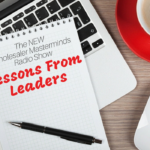A ‘no’ is not a failure. It’s information.
The ability to think on your feet is no excuse for being unprepared.
Small salespeople ask weak questions.
If these statements ring true to you – or simply get you thinking about your areas of improvement – then our returning guest (be sure to listen to our other visits with him from 2011 and 2014) to whom they are attributed is sure to please.
Anthony Iannarino is a highly respected international speaker, author, entrepreneur, and sales leader specializing in the complex business-to-business (B2B) sale. He is also a founder and managing partner of two closely-held, family-owned businesses in the staffing industry, leading both entities in strategic planning while growing sales. Anthony is best known for his work at The Sales Blog, which has helped him gain recognition as a top thought leader in sales strategy. He is also the designer of Level 4 Value Creation™ and Building Consensus, methodologies that help sales organizations achieve transformational, breakthrough results.
Throughout his career, Anthony has helped people in a wide variety of industries and markets think through and overcome their biggest business challenges. His greatest strength is in getting others to build consensus around what must change, and identify the resources within themselves that will drive positive results. Be it through the delivery of staffing solutions or sales strategies, Anthony is a trust builder who focuses on leading transformational conversations, those that create and sustain relationships of value. He is a natural mentor who brings the business acumen, situational knowledge, and experience to each engagement, and lays a solid foundation for future growth.
His book, The Only Sales Guide You’ll Ever Need, is available from Amazon.com.
Success in sales is not situational. It’s individual.
Success in sales is not situational. It’s individual.
This might be the most quoted and most controversial line I wrote in The Only Sales Guide You’ll Ever Need. Some read it and immediately understood and agreed. Others were challenged.
Here are some situations many salespeople believe prevent them from succeeding:
You don’t have the very best product on the market.
You don’t have the best territory.
Your marketing material and your tools are something less than your competitor’s.
You don’t have the economy you want or the government you want.
These things are all situational. They’re external.
Would you believe me if I told you that I know salespeople who struggle to sell the best and most exclusive product on earth, one with every single advantage? Would you be incredulous if I shared with you the story of salesperson who is killing it selling cardboard boxes, what must surely be the most commoditized product on earth?
How is this possible?
It’s possible because success in sales is individual. You are the primary determining factor when it comes to how well–or how poorly–you are doing. This idea is challenging. It’s difficult to believe that you are the source of your success, as well as the source of your less than stellar results.
Believe it or not, it’s true.
Mindsets and Skill Sets
A few years ago, a publisher who had been following my blog reached out to ask me to write a book with them. I drafted a sort of book proposal laying out 21 elements required for success in sales. The first half of the book was made up of beliefs and attributes that create a success-oriented mindset. The second half of the book covered the skills required to sell effectively now.
This was the book I wanted to give to professional salespeople and sales managers.
The acquisition editor hated it. He said, “I don’t understand. What does self-discipline have to do with selling? Why are things like optimism and caring in a sales book?” I asked him, “Have you ever sold or led a sales force?” He admitted that he hadn’t. I explained that the elements that make up the success-oriented mindset are critical to sales. He still didn’t understand.
He rejected the book and asked me to write the kind of book a consultant would write, focusing on a single skill, or some concept that would get me new clients. We parted ways because I was unwilling to write the book he wanted, the beliefs and attributes being too important to leave out of the book I wanted to write.
Weeks before I was to self-publish the book, Penguin Random House reached to me about the book and understood immediately the value it would create for salespeople and sales managers. They understood it was a book to help salespeople succeed at becoming something more.
Are You Really a Trusted Advisor
Salespeople want to be trusted advisors. They want to create so much value for their clients that they earn the right to be their counsel, part of their team, and part of their decision-making process. Let’s look at three of the attributes covered in the first half of The Only Sales Guide You’ll Ever Need that build your capacity to be a trusted advisor.
Resourcefulness: Resourcefulness is the ability to generate ideas and solve problems. Sales is individual, not situational. You may not have the resources you wish you had, but you do have the ability to be creative, to exercise your imagination, and solve problems. You can put your creative energy to work solving your client’s problems.
Your clients need you to help them produce better results. If they could get the better results they want without your ideas, they’d already be producing those results. If you want to be the person your client turns to when they have a problem, be the person that is resourceful enough to find a way or make one by generating new possibilities.
Initiative: If you want to be a trusted advisor, you have to protect your clients from harm. You need to help them avoid any problems or challenges that they might encounter by helping them see around corners. You also have to help them take advantage of of opportunities. You can’t be reactive. You have to be proactive.
From month to month, from quarter to quarter, you have to come up with new value-creating ideas and initiatives that drive your clients results to greater heights. That’s the price you have to pay in advance to be a trusted advisor.
Accountability: You sell outcomes. The outcomes you sell are what determine the status you hold with your clients. If you sell a product, you aren’t going to create enough value to be a trusted advisor. If you sell a strategic outcome, you own that outcome. Taking responsibility for a strategic goal moves you up to a much higher status.
These are some of the attributes you need to have to be a consultative salesperson.
Remember, the beliefs and the behaviors that lead to success are individual, not situational. You have the ability to embody these attributes simply by gaining an awareness of what they are and developing them to the fullest extent possible.
Doing so will not only help you win new business, it will help you become the partner your clients need, and it will build lifetime relationships with you in the role of trusted advisor and strategic counsel.
Written by Anthony Iannarino


 Great Wholesalers Know How to Unlock Their Creative Mind with Scott Shellstrom
Great Wholesalers Know How to Unlock Their Creative Mind with Scott Shellstrom Lessons From Leaders #10: Interview with Sue Thompson, Executive Vice President and Head of SPDR Americas Distribution
Lessons From Leaders #10: Interview with Sue Thompson, Executive Vice President and Head of SPDR Americas Distribution There’s Everything Funny About Wholesaling with Karyn Buxman
There’s Everything Funny About Wholesaling with Karyn Buxman The Secrets of Million Dollar Sellers with Steven Harvill
The Secrets of Million Dollar Sellers with Steven Harvill Confidence and Courage: Improve Your Practice (and Change Your Life) in 5 Seconds with Mel Robbins
Confidence and Courage: Improve Your Practice (and Change Your Life) in 5 Seconds with Mel Robbins